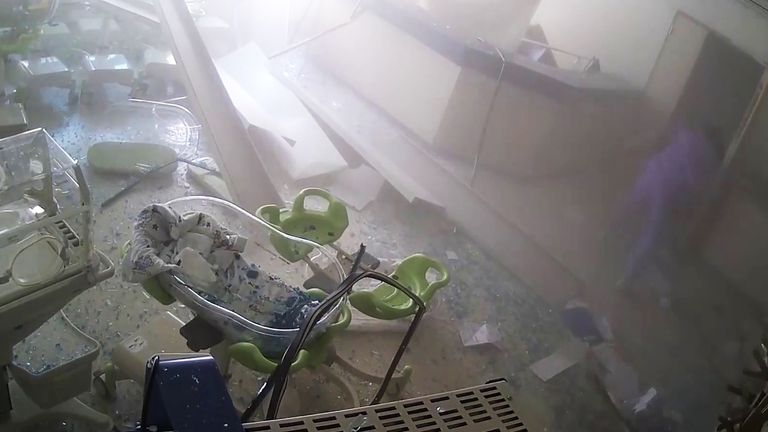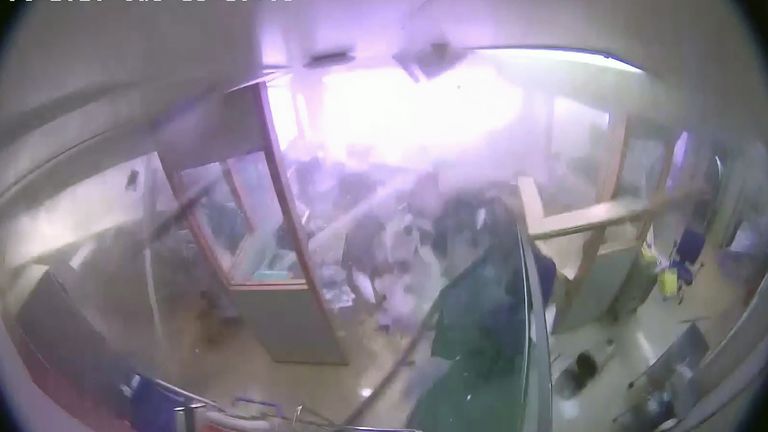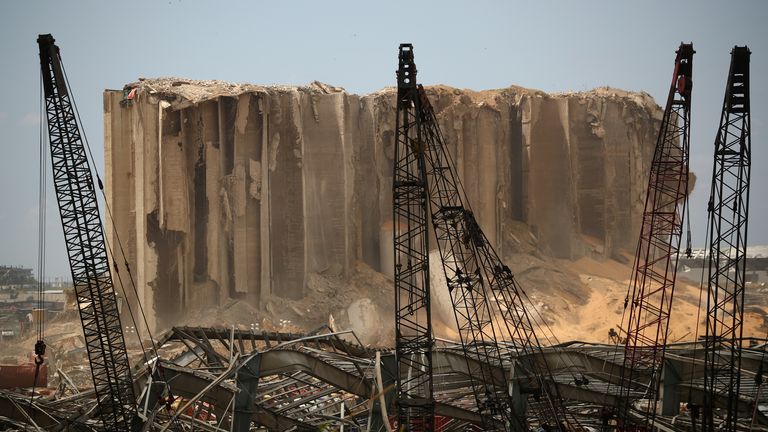It’s often difficult to truly convey what people go through when a disaster strikes. But we now live in an age when lives are constantly recorded.
The Saint George Hospital in Beirut has 230 security cameras – they recorded the moments of Beirut‘s tragedy as a blast rocked the city.
The Chief Medical Officer, Alexander Nehme, gave Sky News exclusive access to the footage to highlight the hospital and the city’s plight.
Each angle tells its own horrible story. The camera on the helipad on the top of the building – which is about a mile from the port – records the beautiful stillness of a warm uneventful Tuesday afternoon last week.
The port and the shimmering Mediterranean Sea bathed in the warm early evening glow can be seen in the background.
Then at 6.08pm there’s an eruption as an apocalyptic blast of debris and rubble rolls across the city like a giant wave.
Down below in the bowels of the building other cameras record medical staff fleeing in terror before the lights black out.
In the postnatal ward a nurse hears what was the first small explosion. She’s curious before realising something terrible is happening. Disorientated, she gets to her feet and rushes to the babies in her care off camera and takes them to safety.
Nurse Pamela Zeinoun was in the ward above – the neonatal intensive care unit. They treat premature babies. The video from the ward’s camera shows her working just moments before the explosion.
She feels the first tremor and then the room collapses – smoke, rubble and fear.
Amazingly Pamela was barely scratched but what happened after she fought her way out of the wreckage is truly astonishing.
“They (nurses) were very badly injured. They were standing over there and they looked at me and I looked at them and started to scream: ‘what happened?’
“They looked at each other and they were all bleeding. They couldn’t even talk. All the ceiling was on the floor.
“I grabbed the ceiling with my hand and tried to pull it away just to know where the babies were because the incubators moved. They weren’t in the same place.
“I held the three babies and went through this door. We needed to go through the exit. We didn’t know where the exit was. We were used to the exit being on our left side but there was nothing on our left side.
“We walked around 5km in the street so I could get to another hospital.”
Much of the hospital was wrecked. Seventeen people were killed – nurses, patients and visitors among the victims. But when you see the footage it’s a miracle the loss of life was not greater in the main lobby – people scatter and then a blast wave of glass, splintered wood and concrete.
Professor Georges Juvelekian was in his clinic at the time – he’d just finished a consultation. If a colleague had not rescued him he says he could have bled to death.
“We should be proud of what we’ve done. What this hospital did in eight hours evacuating over 300 patients to safety despite the lack of power and glass everywhere and unsafe environment and lack of resources is a miracle by itself and speaks to the greatness of these people,” he said.
The cameras around the hospital record the aftermath – it’s a city in shock and panic.
A few minutes after the explosion, the injured from across the neighbourhood run to the emergency room not knowing that the medical centre had also become a casualty.
The hospital is now appealing for donations and hopes to be up and running soon. But it will cost tens of millions of pounds to fix.
Across Beirut you can find many stories of heroism and bravery. It’s been left to the doctors, nurses, and volunteers to clear up the damage.
This is a place where corruption never allowed the functioning of a healthy state to grow. But it remembers its victims.
The challenges of mending this fractured city, its politics and economy, will take years to overcome.




